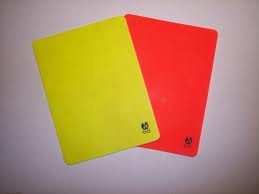Last week I wrote about the World Championship refereeing and characterized it as “fair and honest”. I also noted that, overall, the standard was good if one takes into account that many of the referee couples did not previously have much experience from this type of event. I have now received some feedback from acquaintances who were present in Sweden and felt that they I should have noted the inconsistency that was evident from couple to couple and also from match to match with the same couple.
I have to agree with these comments to some extent. This kind of inconsistency was noticeable, although, as I emphasized, the teams in a match were generally treated in a very even-handed way. To some extent, a lack of consistency (or a “clear line”) for instance in handling personal punishments can sometimes depend on a lack of clarity in the instructions received. But here I felt that most of the concerns were related to a shortage of Championship level experience on the part of several couples. When the pressure is on, then there is a risk that more spontaneity and reliance on sudden instincts will become apparent, as opposed to the ability to draw on years and years of experience with the same kind of situations in the same kind of atmosphere.
There is simply no easy substitute for experience. If a referee needs to analyze and think about every situation and decision, instead of just relating it to his/her vast “archives” of game situations, there will inevitably be deviations from a clear line and instead a sense of relative inconsistency. But this does NOT mean that the IHF policy for nominating referees is incorrect. As I noted in my previous article, there is not much choice, as the previous generation of top referees is for the most part no longer available. So it is a matter of making good judgments in selecting and supporting the best of a younger generation.
And it cannot be emphasized enough: it is not sufficient to make good selection decisions; these referees need a particularly strong education and nurturing to help make up for their lack of experience. Of course, they need to be supported in their respective continents through optimal assignments as a preparation between Championships, something which particularly outside Europe is easier said than done. But the IHF needs to see them as a group that constantly needs to be monitored and supported. In addition to those who were in Sweden, there may be up to ten more couples who could be seen as legitimate candidates for the next Men’s World Championship in 2013.
This combined group simply must get special attention, not just through sporadic moments of observation and feedback, but through a massive and systematic follow-up effort. While there are no shortcuts in making up for experience, this kind of close and personal monitoring will clearly contribute to increased stability and consistency. I know from my own experience that the IHF Referee Commission has only limited resources, especially in terms of manpower. But these resources can be supplemented, and especially used better through substantially increased financial resources.
Surely the IHF top management, including President Moustafa, will realize that the investment in the IHF Global Referee Training Program that has been so successful up to this point is just a start. Now the continuous development of this asset must follow, without any constraints in political and financial support. This is the only hope of having “the best of both worlds”: young and talented referees who are suited to the fast-paced game but also trained and competent well beyond their years of experience.
